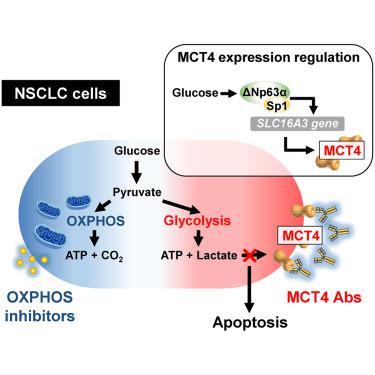Molecular Therapy: Oncology ( IF 5.3 ) Pub Date : 2020-06-24 , DOI: 10.1016/j.omto.2020.06.012 Ting-Chun Kuo , Kuo-Yen Huang , Shuenn-Chen Yang , Sean Wu , Wei-Chia Chung , Yih-Leong Chang , Tse-Ming Hong , Shu-Ping Wang , Hsuan-Yu Chen , Tzu-Hung Hsiao , Pan-Chyr Yang

|
Targeting metabolic reprogramming is an emerging strategy in cancer therapy. However, clinical attempts to target metabolic reprogramming have been proved to be challenging, with metabolic heterogeneity of cancer being one of many reasons that causes treatment failure. Here, we stratified non-small cell lung cancer (NSCLC) cells, mainly lung adenocarcinoma, based on their metabolic phenotypes and demonstrated that the aerobic glycolysis-preference NSCLC cell subtype was resistant to the OXPHOS-targeting inhibitors. We identified that monocarboxylate transporter 4 (MCT4), a lactate transporter, was highly expressed in the aerobic glycolysis-preference subtype with function supporting the proliferation of these cells. Glucose could induce the expression of MCT4 in these cells through a ΔNp63α and Sp1-dependent pathway. Next, we showed that knockdown of MCT4 increased intracellular lactate concentration and induced a reactive oxygen species (ROS)-dependent cellular apoptosis in the aerobic glycolysis-preference NSCLC cell subtype. By scanning a panel of monoclonal antibodies with MCT4 neutralizing activity, we further identified a MCT4 immunoglobulin M (IgM) monoclonal antibody showing capable anti-proliferation efficacy on the aerobic glycolysis-preference NSCLC cell subtype. Our findings indicate that the metabolic heterogeneity is a critical factor for NSCLC therapy and manipulating the expression or function of MCT4 can be an effective strategy in targeting the aerobic glycolysis-preference NSCLC cell subtype.
中文翻译:

单羧酸转运蛋白 4 是具有有氧糖酵解偏好的非小细胞肺癌的治疗靶点。
针对代谢重编程是癌症治疗的新兴策略。然而,针对代谢重编程的临床尝试已被证明具有挑战性,癌症的代谢异质性是导致治疗失败的众多原因之一。在这里,我们根据非小细胞肺癌(NSCLC)细胞(主要是肺腺癌)的代谢表型对其进行分层,并证明有氧糖酵解偏好的 NSCLC 细胞亚型对 OXPHOS 靶向抑制剂具有耐药性。我们发现单羧酸转运蛋白 4 (MCT4)(一种乳酸转运蛋白)在有氧糖酵解偏好亚型中高度表达,具有支持这些细胞增殖的功能。葡萄糖可以通过 ΔNp63α 和 Sp1 依赖性途径诱导这些细胞中 MCT4 的表达。接下来,我们发现 MCT4 的敲低会增加细胞内乳酸浓度,并在有氧糖酵解偏好的 NSCLC 细胞亚型中诱导活性氧 (ROS) 依赖性细胞凋亡。通过扫描一组具有 MCT4 中和活性的单克隆抗体,我们进一步鉴定了 MCT4 免疫球蛋白 M (IgM) 单克隆抗体,该抗体对有氧糖酵解偏好的 NSCLC 细胞亚型表现出强大的抗增殖功效。我们的研究结果表明,代谢异质性是 NSCLC 治疗的关键因素,操纵 MCT4 的表达或功能可能是针对有氧糖酵解偏好的 NSCLC 细胞亚型的有效策略。






























 京公网安备 11010802027423号
京公网安备 11010802027423号